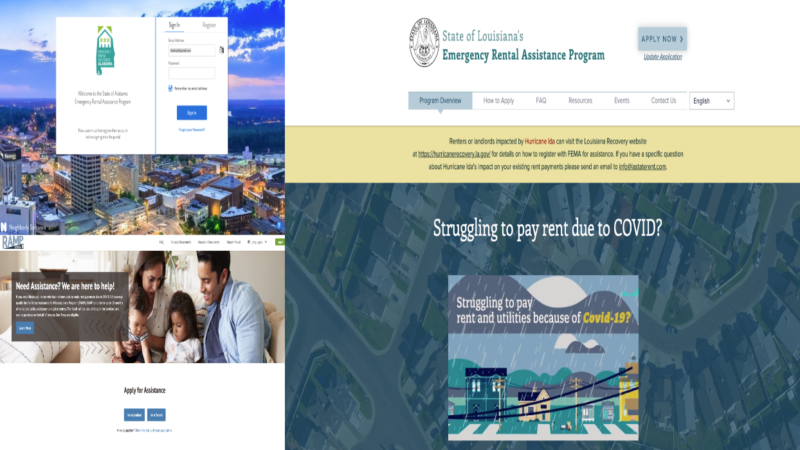Why nearly $910 million meant to prevent evictions in Gulf States has been left unspent
Renters that have applied for rental assistance in Alabama, Louisiana and Mississippi have been left waiting and frustrated for their states to provide the money. New data from the U.S. Department of the Treasury says the three states combined have nearly $910 million left unspent in federal funds meant to keep renters from being evicted.
Mississippi, Alabama and Louisiana gave out about $45 million in federal funds in September to keep renters from being evicted, according to data from the U.S. Department of the Treasury.
These states, however, have another $910 million that still hasn’t been spent, according to the data. In Alabama and Louisiana, nearly $24 million fewer dollars were spent last month when compared to August.
The delay in getting the money into the hands that need it is happening despite the Centers for Disease Control and Prevention’s eviction moratorium being lifted at the start of September, putting more people at risk for eviction.
The relief money comes from the Emergency Rental Assistance Program, established by Congress on Dec. 27, providing up to $25 billion to help Americans at risk of eviction due to financial hardship caused by the coronavirus pandemic. Three months later, the American Rescue Plan Act added another $21.5 billion to the program.
But the money was put in the hands of states and local governments, which have been slow to actually spend the funds.
Legal aid offices in the three states said they’ve been receiving a slow and steady increase in calls from renters worrying about or being threatened with evictions. Many callers said they’ve applied for rental assistance programs, but have yet to get the funds. Some judges have been willing to halt eviction orders while renters wait on the states to deliver, according to Sam Buchanan, executive director of the Mississippi Center for Legal Services.
“Fortunately the courts are respecting, for a lack of a better word, the fact that they’ve applied,” Buchanan said.
A lack of guidance from the Trump Administration for how to spend the funds in the early days created a slow start for the program. But each state and county housing authority had different levels and its own unique red tape to deal with — or in some cases create.
Housing authorities, especially those in southern states, often had little-to-no experience executing a large scale rental assistance program. When the Alabama Housing Finance Authority got its system up, it had to balance preventing fraud with getting the money out quickly.
During a legislative oversight hearing in late September, Alabama Senator Rodger Smitherman argued the state got the balance wrong — extensive documentation requirements and vetting kept federal dollars from getting to renters, Smitherman said.
“We more concerned about [fraud] than servicing these people,” Smitherman said. “We strangling these people.”
This concern over fraud has clogged the rental assistance pipelines in many states across the country, including in Mississippi and Louisiana.
In Louisiana, the federal moratorium received an indirect extension when the state created its own moratorium following Hurricane Ida. That moratorium, however, ended Sept. 24, leaving the southeastern part of the state to deal with two housing crises at once.
The destruction of homes in the region from Ida has driven up rent, according to housing experts. In New Orleans, at least 125 evictions were filed between Oct. 3 and 10, the highest number for the city in almost a year.
“When we are both failing to implement a moratorium on evictions and keep renters housed and failing to properly and quickly distribute emergency rental assistance we are not living up to the values we claim to have,” said Cashauna Hill, the executive director of the Louisiana Fair Housing Action Center.
This story was produced by the Gulf States Newsroom, a collaboration between Mississippi Public Broadcasting, WBHM in Birmingham, Alabama, WWNO in New Orleans and NPR.
Auburn fires coach Hugh Freeze following 12th loss in his last 15 SEC games
The 56-year-old Freeze failed to fix Auburn’s offensive issues in three years on the Plains, scoring 24 or fewer points in 17 of his 22 league games. He also ended up on the wrong end of too many close matchups, including twice this season thanks partly to questionable calls.
In a ‘disheartening’ era, the nation’s former top mining regulator speaks out
Joe Pizarchik, who led the federal Office of Surface Mining Reclamation and Enforcement from 2009 to 2017, says Alabama’s move in the wake of a fatal 2024 home explosion increases risks to residents living atop “gassy” coal mines.
‘It’s like feeling the arms of your creator just wrapped around you’: a visit to a special healing Shabbat
Members of Temple Emanu-El in Birmingham gathered recently for their traditional Friday Shabbat service. But this particular service was different, as could be seen by all the people dressed in their finest pink.
Space Command is coming to Huntsville. What might that mean for first-time homebuyers
While Huntsville has been a more affordable market than other growing cities, what’s it been like for those looking for their first home?
Colorado says relocation of Space Command to Alabama is ‘punishment’ for mail-in voting
The litigation announced by Colorado Attorney General Phil Weiser asks a federal judge to block the move as unconstitutional.
Breaking down Alabama’s CHOOSE Act
It’s been a year since Alabama legislators passed the CHOOSE Act allowing families to apply for state funds to use towards homeschool expenses and tuition for participating private schools. The Alabama Daily News’ education reporter Trisha Powell Crain has been diving into how the funds are being used. WBHM’s Andrew Gelderman sat down with her to talk about what we’re seeing so far.









